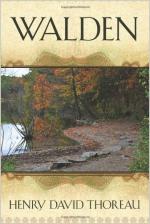|
This section contains 303 words (approx. 1 page at 400 words per page) |

|
Chapter 4 Summary
Following the exposition on the importance of attending to the written word in the chapter "Reading," Thoreau introduces a paradox in the next chapter, "Sounds," emphasizing the value of listening to the natural and man-made aspects of the world, having confirmed, in the previous chapter, the value and importance of reading.
Thoreau presents sounds as the language through which all things speak. He writes about the sunlight streaming through his window, the songs of birds and the fluttering of birds through his cabin. To contrast this, he then mentions the sound in the distance of a wagon on the highway.
By paying attention to the sounds all around him, Thoreau asserts that his life never without amusement. He describes the location of his house and lists the wildlife and plants that are in the vicinity; Thoreau's specificity and exactness when identifying the local...
(read more from the Chapter 4 Summary)
|
This section contains 303 words (approx. 1 page at 400 words per page) |

|




